Top 12 Dictation Software for Medical Professionals in 2025
The relentless pace of clinical work leaves little room for inefficient processes, and manual charting is a prime culprit. The hours spent typing or handwriting patient notes, referrals, and reports add up, contributing to physician burnout and administrative overhead. This time-consuming task not only detracts from patient care but also introduces the risk of documentation errors, which can have significant clinical and financial consequences. For healthcare providers, finding a way to streamline this workflow is not just a matter of convenience; it’s a strategic necessity for maintaining a sustainable and profitable practice.
This comprehensive guide is designed to help you navigate the complex market of dictation software for medical professionals. We will move beyond marketing claims to provide in-depth, practical reviews of the top 12 solutions available today. Each review breaks down critical factors such as accuracy, EHR integration capabilities, security compliance (including HIPAA), and specific use cases for different specialties. The core technology enabling this software is voice-to-text conversion. To understand more about its specific applications in the medical field, you can delve into resources on medical voice-to-text applications.
Our analysis is structured to give you a clear, side-by-side comparison, complete with screenshots, direct links, and an honest assessment of each platform’s strengths and limitations. Whether you are a solo practitioner, part of a large hospital system, or a compliance officer, this listicle will equip you with the information needed to select the software that best fits your operational needs and budget.
1. Whisperit
Whisperit stands out as a premier AI-powered platform, offering more than just transcription. It’s an integrated workspace designed for professionals in high-stakes fields like healthcare, where both accuracy and data security are non-negotiable. While its roots are deep in the legal sector, its core functionalities are exceptionally well-suited for medical environments, making it a top-tier choice for dictation software for medical professionals. The platform’s strength lies in its ability to transform complex spoken notes, patient histories, and clinical observations into structured, actionable text with remarkable speed.
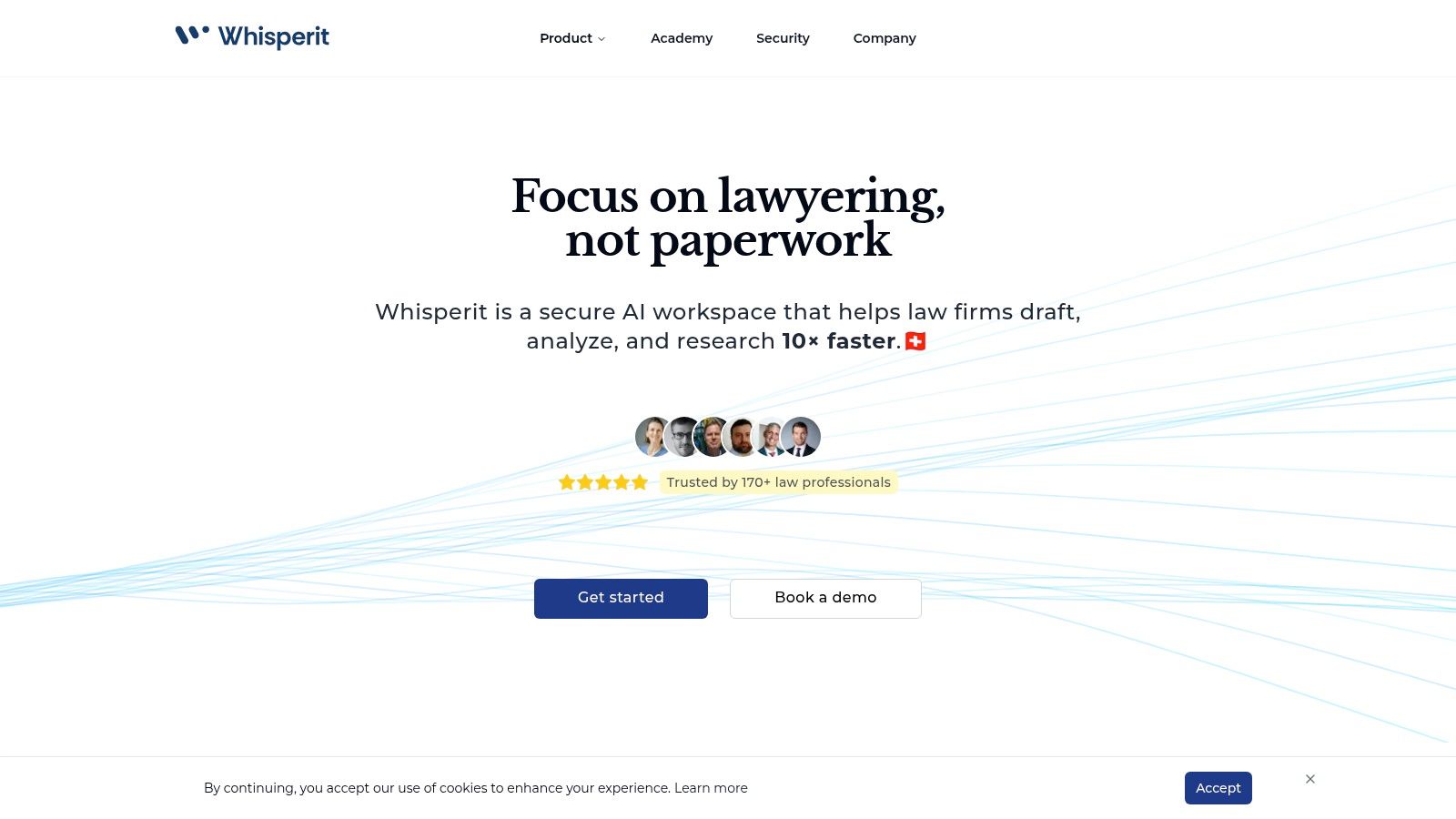
The platform’s sophisticated AI engine goes beyond simple speech-to-text. It can analyze and consolidate vast amounts of information from various sources, such as existing patient files (PDFs) and referral emails. This capability allows clinicians to generate concise summaries and comprehensive overviews in a fraction of the time it would take manually, streamlining patient intake and chart preparation. Whisperit emphasizes a secure, collaborative environment, essential for modern medical practices.
Key Strengths & Medical Use Cases
What sets Whisperit apart is its focus on a secure, high-productivity workflow. The natural language processing is advanced enough to understand complex medical terminology, reducing the need for constant corrections.
- Advanced AI Analysis: Consolidate patient records, lab results, and dictated notes into a coherent summary. This drastically cuts down on administrative time needed to prepare for patient consultations.
- Unparalleled Security: All data is hosted exclusively in Switzerland and is protected by top-tier encryption. It meets stringent GDPR and SOC 2 compliance standards, providing the necessary assurance for handling sensitive Protected Health Information (PHI).
- Workflow Integration: Customizable templates for SOAP notes, patient summaries, or referral letters can be created and shared across a clinical team, ensuring consistency and efficiency.
Real-World Impact: Imagine dictating patient encounter notes directly into a system that not only transcribes them with high accuracy but also cross-references the information with the patient's existing chart to highlight potential drug interactions or missing information. That is the level of productivity Whisperit enables.
Access and Implementation
Getting started with Whisperit requires a personalized approach. The company offers demos and expert onboarding to tailor the platform to your specific clinical workflow. While pricing is not publicly listed and requires a custom quote, this ensures that the solution is scaled appropriately for your practice, whether you are a solo practitioner or a large hospital department. The platform’s commitment to security and its powerful AI features make it a significant investment in operational efficiency.
For more details on its application in healthcare, you can learn more about Whisperit's approach to medical dictation software on their blog.
2. Nuance Communications – Dragon Medical One
Nuance’s Dragon Medical One is the long-standing industry benchmark for clinical speech recognition, earning its place through exceptional accuracy and deep EHR integration. This cloud-based platform allows clinicians to dictate directly into any clinical or non-clinical Windows-based application, from major EHR systems like Epic and Cerner to Microsoft Word. Its primary strength lies in its extensive, AI-powered medical vocabulary, which covers over 90 medical specialties and subspecialties, ensuring high out-of-the-box accuracy.
The platform is designed for enterprise-level deployment, providing a consistent voice profile that follows the user across workstations and devices. This mobility is crucial for physicians who move between exam rooms, offices, and hospitals. While it comes at a premium price point, the efficiency gains in clinical documentation workflows often justify the investment. Its robust performance makes it a top choice for healthcare organizations seeking reliable and secure dictation software for medical professionals. For a deeper dive into its capabilities, you can explore detailed reviews of medical speech recognition software.
- Best For: Large healthcare systems and private practices needing best-in-class accuracy and seamless EHR integration.
- Key Feature: A single, cloud-hosted voice profile that enables users to dictate on any workstation with the software installed.
- Pricing: Subscription-based, typically quoted per user per month. Contact Nuance or a reseller for specific pricing.
- Limitation: The cost can be a significant barrier for smaller practices, and it is primarily optimized for Windows environments.
Visit Nuance Dragon Medical One
3. VoiceboxMD
VoiceboxMD presents a modern, AI-driven solution for clinical dictation, positioning itself as an accessible and highly adaptable alternative to legacy systems. It leverages machine learning to continuously refine its voice recognition accuracy, offering real-time transcription directly into most EHRs and other clinical applications. Its strength lies in a user-friendly interface combined with a robust, specialized medical vocabulary that supports numerous specialties, ensuring clinicians can become productive with minimal initial training. The platform’s design focuses on straightforward integration and ease of use.
This software is particularly well-suited for practices seeking a flexible and cost-effective tool without sacrificing core functionality. By providing customizable templates and macros, VoiceboxMD allows medical professionals to personalize their documentation workflow, which can significantly speed up note completion. While it may require some initial setup to perfectly align with specific accents or unique terminology, its ongoing learning capability makes it a strong contender among dictation software for medical professionals looking for a balance of performance and value.
- Best For: Small to mid-sized practices and individual clinicians looking for a user-friendly, AI-powered dictation tool with EHR compatibility.
- Key Feature: Machine learning algorithms that continuously adapt and improve recognition accuracy based on the user's voice and corrections over time.
- Pricing: Subscription-based model. Interested users must contact VoiceboxMD directly for a customized quote.
- Limitation: The trial period is limited, and achieving peak accuracy might require an initial investment of time for customization and system training.
4. Sonix
Sonix positions itself as a fast and accurate automated transcription service rather than a real-time dictation tool, making it a unique player for medical documentation. It excels at converting audio and video recordings of patient encounters, medical lectures, or research interviews into text with impressive speed. Its standout feature is robust multilingual support, recognizing over 50 languages and dialects, a critical capability for healthcare providers serving diverse patient populations or collaborating internationally. The platform uses advanced AI to generate transcripts that include timestamps and speaker identification.
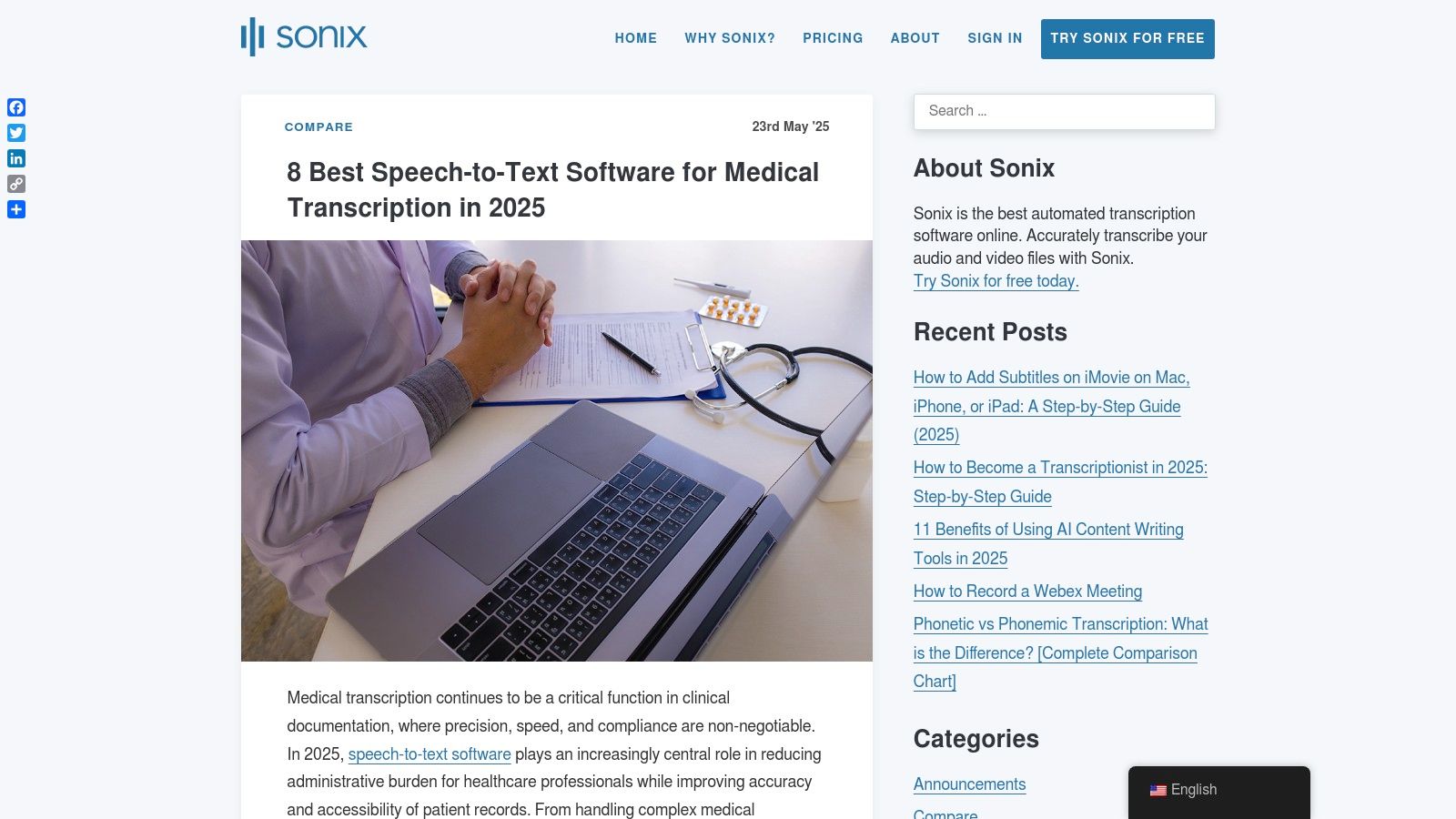
While not a direct EMR dictation tool, Sonix is an excellent resource for converting existing recordings into searchable, editable text. This makes it a powerful piece of dictation software for medical professionals who need to document telehealth sessions, create educational materials, or transcribe research data. Its user-friendly interface allows for easy uploading, and the custom vocabulary feature can be trained to recognize specific medical terms, improving accuracy over time.
- Best For: Medical researchers, educators, and clinicians needing to transcribe pre-recorded audio or video files, especially in multilingual settings.
- Key Feature: High-accuracy transcription in over 50 languages with speaker labeling and a custom medical vocabulary builder.
- Pricing: Offers a pay-as-you-go Standard plan, a Premium subscription with more features, and custom Enterprise pricing.
- Limitation: It is not a live dictation tool for direct EMR entry; complex medical terminology may still require manual review and correction.
5. Mobius MD – Mobius Conveyor
Mobius Conveyor offers a uniquely flexible and streamlined approach to clinical dictation, distinguishing itself with true cross-platform compatibility. Unlike many competitors that are Windows-centric, Mobius allows physicians to use their iPhone or iPad to dictate directly into any text field on either a Mac or Windows computer. This versatility is its core strength, transforming a personal device into a powerful medical microphone without needing complex hardware or software installations on the clinical workstation. The setup is remarkably simple, appealing to tech-savvy clinicians and those seeking minimal IT overhead.
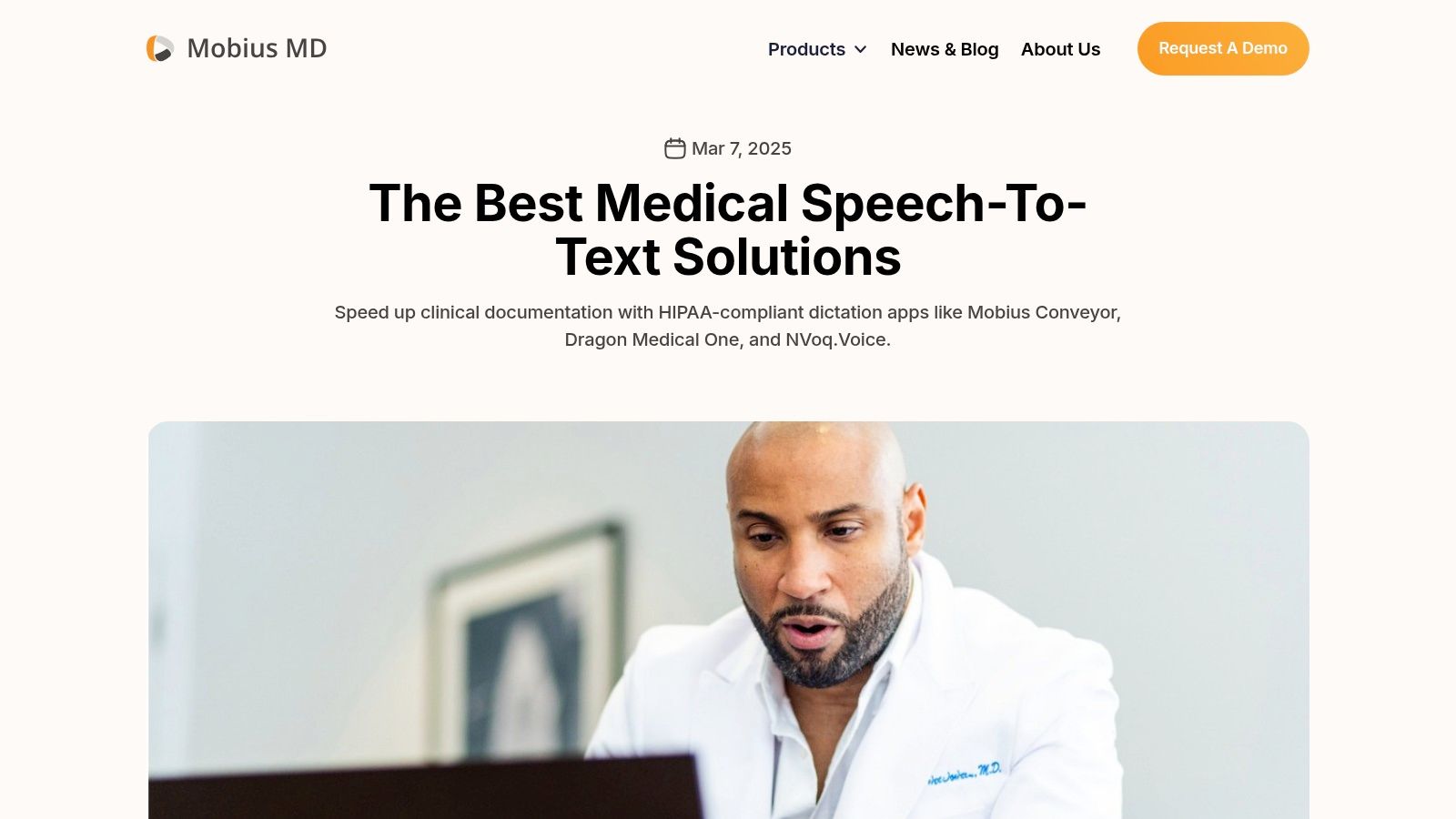
The platform also includes a Secure Memos feature, enabling providers to capture notes on the go and later transfer them into the EHR, ensuring no detail is lost between patient encounters. While it may not have the deep, enterprise-level feature set of some larger platforms, its ease of use and adaptability make it an excellent choice for modern, agile clinical environments. This makes it a standout piece of dictation software for medical professionals who prioritize mobility and cross-system functionality.
- Best For: Clinicians and small practices using a mix of Mac and Windows systems who want a simple, mobile-driven dictation solution.
- Key Feature: The ability to use an iPhone as a wireless microphone to dictate into any application on any computer, regardless of OS.
- Pricing: Flexible subscription options available, typically billed per provider. Check the website for current pricing tiers.
- Limitation: Relies on a stable internet connection for functionality and has fewer advanced macros and customization features than some competitors.
Visit Mobius MD – Mobius Conveyor
6. DeepScribe
DeepScribe takes a unique approach to clinical documentation by moving beyond simple dictation. Instead of requiring clinicians to dictate notes, its ambient AI listens to the natural conversation between a patient and provider, automatically generating comprehensive clinical documentation in real-time. This system is designed to eliminate the burdensome task of after-hours charting and allow physicians to focus entirely on the patient during the visit. The platform integrates with major EHR systems and uses specialty-specific templates to structure the generated notes according to practice workflows.
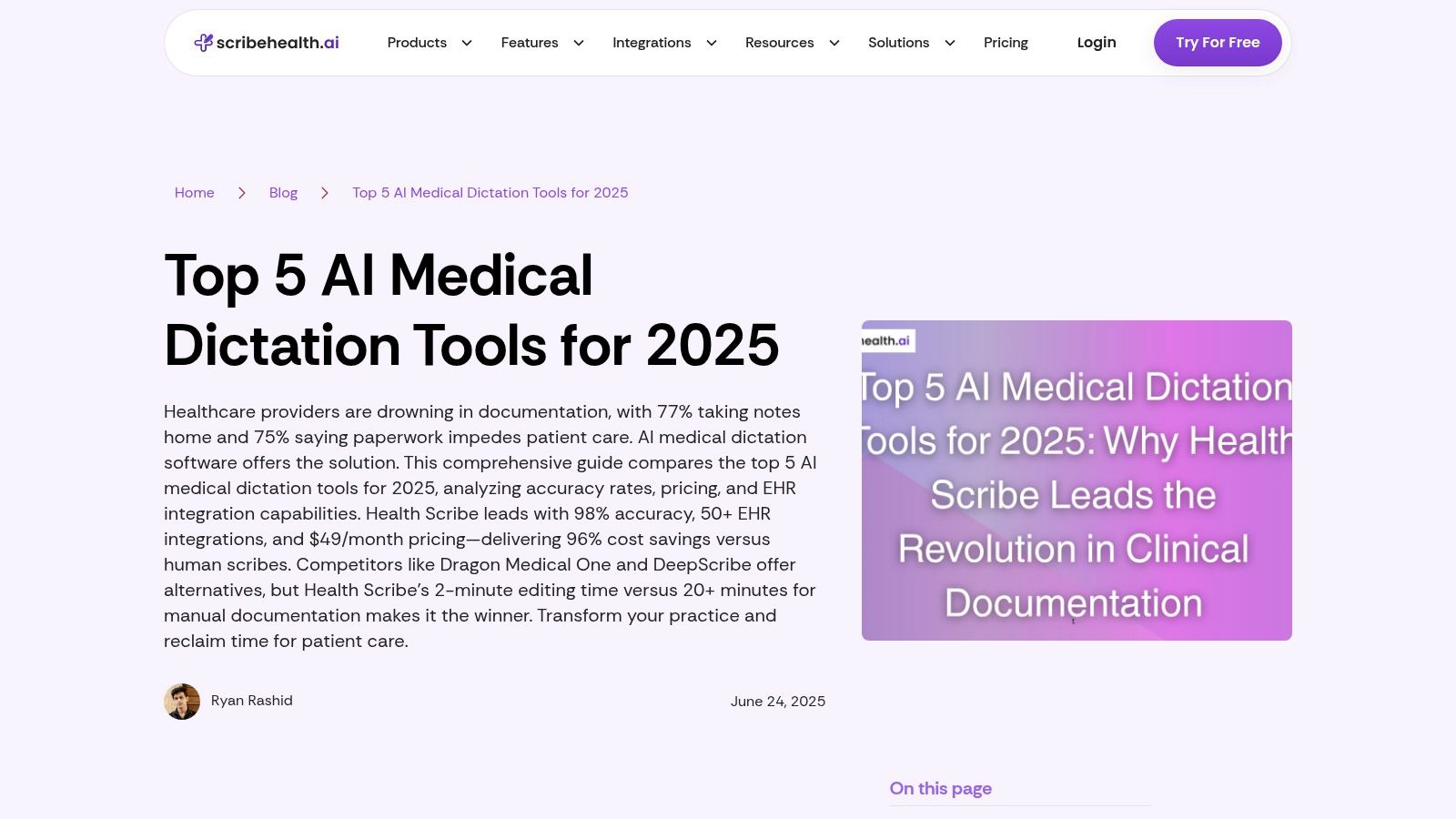
Its core strength is in restoring the natural dynamic of the patient encounter, a key factor in improving clinical documentation and reducing provider burnout. While it offers a revolutionary workflow, the AI-generated notes may still require manual review for accuracy and nuance, particularly in complex cases. This makes it an excellent example of advanced AI-powered dictation software for medical professionals looking to completely overhaul their documentation process rather than just speed it up.
- Best For: Clinicians and practices aiming to eliminate manual note-taking and maximize patient-facing time.
- Key Feature: Ambient AI that captures and transcribes natural patient conversations into structured clinical notes.
- Pricing: Custom pricing based on practice size and specialty. A demo is required to receive a quote.
- Limitation: Customization options can be less extensive than traditional dictation software, and final notes require physician review and sign-off.
7. Philips SpeechLive
Philips SpeechLive distinguishes itself with a flexible, cloud-based workflow that combines real-time speech recognition with a professional human transcription service. This hybrid approach allows medical professionals to choose the best method for each document, whether it's instant AI-powered dictation for quick notes or sending complex reports to a human transcriber for maximum accuracy. The platform is designed for mobility, with a robust smartphone app that turns any phone into a professional dictation microphone, allowing clinicians to capture notes on the go. Its browser-based system ensures easy access from any computer without complex software installation.
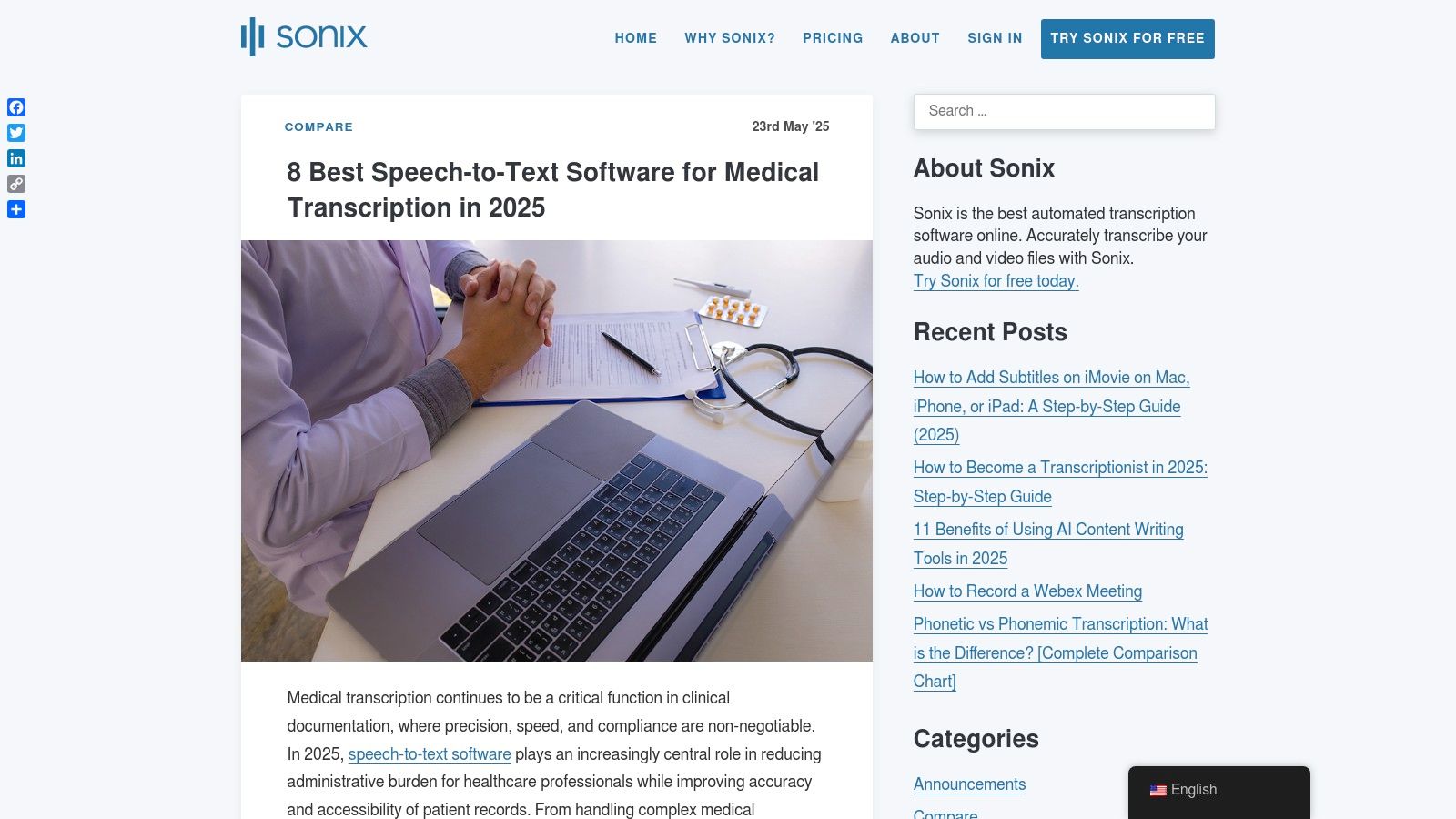
The centralized workflow management is a key benefit, enabling practices to route dictations based on priority or specialty, ensuring efficient turnaround times. This system is an excellent piece of dictation software for medical professionals in smaller practices or specialized clinics who need a versatile solution without the enterprise-level overhead. The platform’s adaptability makes it a strong contender for those who value both automated efficiency and the nuance of human transcription.
- Best For: Small to medium-sized practices and individual clinicians who need a flexible blend of automated and human-powered transcription services.
- Key Feature: Hybrid transcription model that allows users to seamlessly switch between AI speech-to-text and a professional human transcription service.
- Pricing: Tiered subscription plans are available, with options for speech recognition minutes and separate pricing for human transcription services.
- Limitation: The mobile app can occasionally experience glitches, and its built-in AI may not have the extensive medical vocabulary of dedicated enterprise solutions.
8. Amazon Transcribe Medical
Amazon Transcribe Medical is a powerful speech-to-text API service from Amazon Web Services (AWS) designed specifically for the healthcare industry. Unlike standalone software, it is a building block for developers to integrate highly accurate medical transcription into their own clinical applications, telehealth platforms, or documentation workflows. Its core strength lies in its advanced machine learning models, which are pre-trained on a massive corpus of medical terminology, enabling it to accurately capture complex clinical conversations, including physician-patient dialogues and physician-to-physician consultations.
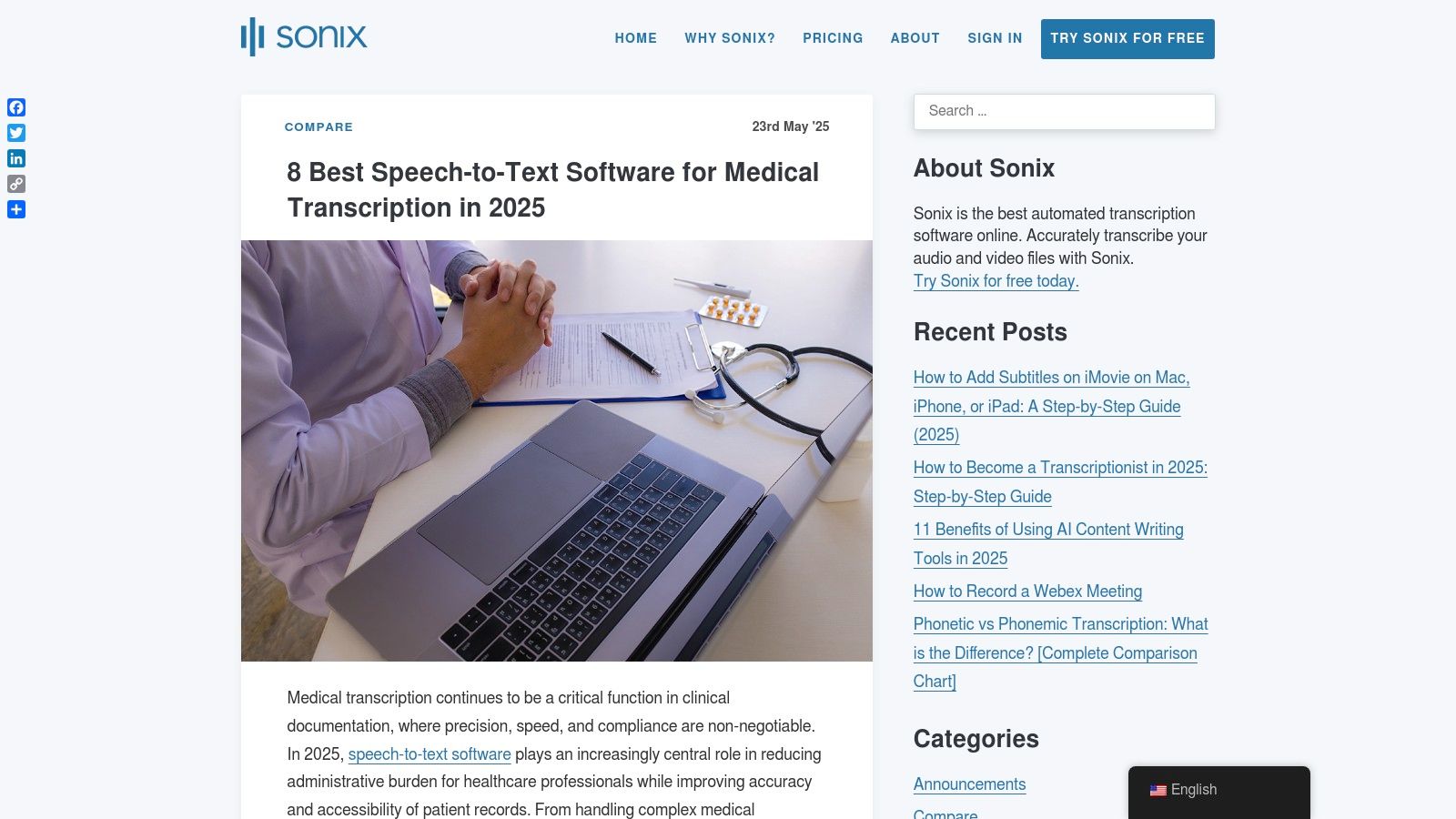
The service is HIPAA eligible and excels at processing both real-time audio streams and pre-recorded audio files (batch transcription). It automatically identifies speakers, punctuates text, and structures the output for easy ingestion into Electronic Health Record (EHR) systems. This makes it an ideal solution for organizations looking to build custom, scalable dictation software for medical professionals without starting from scratch. To see how it fits into the broader ecosystem, you can find more on speech to text for medical use.
- Best For: Healthcare organizations and tech companies wanting to build custom voice-enabled clinical applications or integrate transcription into existing platforms.
- Key Feature: HIPAA-eligible, API-based service with specialized machine learning models for high-accuracy medical terminology recognition and speaker identification.
- Pricing: Pay-as-you-go model based on the amount of audio transcribed per second, per month. Check AWS for current pricing tiers.
- Limitation: It is not an out-of-the-box application; it requires development resources to integrate into a functional workflow and primarily supports US English.
Learn More about Amazon Transcribe Medical
9. nVoq – SayIt
nVoq's SayIt presents a compelling, cloud-based alternative for healthcare professionals seeking a flexible and affordable dictation solution. As a HIPAA-compliant platform, SayIt is built for the modern clinical environment, providing accurate speech-to-text capabilities accessible from any device with an internet connection. It stands out with its focus on easy implementation and customizable shortcuts, which allow users to create voice-activated commands for inserting frequently used text blocks or navigating EHR fields, significantly speeding up documentation.
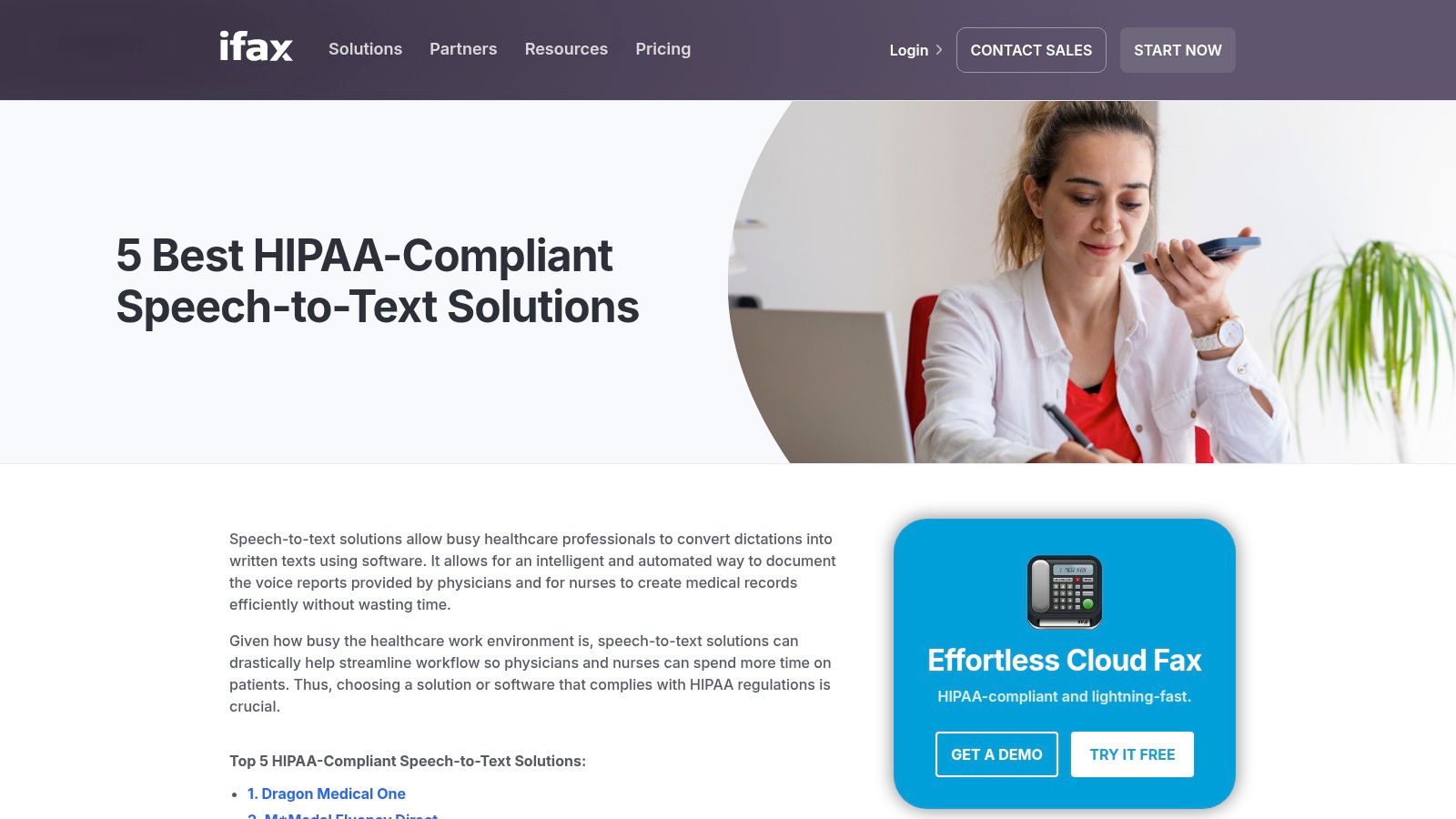
The platform supports a broad range of medical specialties right out of the box, making it a versatile tool for varied clinical settings. While its vocabulary is robust, it may occasionally struggle with highly obscure or newly emerging medical terminology compared to more enterprise-focused systems. Nonetheless, for clinics and healthcare providers prioritizing affordability and ease of use, SayIt is a powerful piece of dictation software for medical professionals that delivers substantial value and efficiency without a hefty price tag or complex setup.
- Best For: Small to medium-sized practices and individual clinicians looking for a cost-effective, cloud-based dictation tool with strong customization features.
- Key Feature: Voice-activated shortcuts and templates that automate repetitive documentation tasks directly within the EHR.
- Pricing: Subscription-based, often cited as more affordable than larger competitors. Contact nVoq for a direct quote.
- Limitation: Performance is dependent on a stable internet connection, and it may not recognize extremely uncommon medical terms as consistently as premium-priced alternatives.
Visit nVoq – SayIt
10. M*Modal Fluency Direct
M*Modal Fluency Direct is a formidable cloud-based speech recognition platform that focuses heavily on front-end, real-time dictation within the EHR. Acquired by 3M, it leverages advanced natural language understanding (NLU) to interpret the context of a physician's dictation, not just transcribe words. This allows it to proactively assist with clinical documentation improvement (CDI) by identifying and highlighting any inconsistencies or missing information in the note as it's being created, directly at the point of care.
This platform stands out by offering computer-assisted physician documentation (CAPD) functionality, which provides real-time feedback to clinicians. Its ability to integrate with various EHRs and support voice-activated commands makes it a powerful piece of dictation software for medical professionals aiming to streamline their charting process. Given its focus on clinical data integrity, it is crucial to ensure it meets all regulatory requirements. For more details on compliance, you can explore information about HIPAA-compliant dictation software.
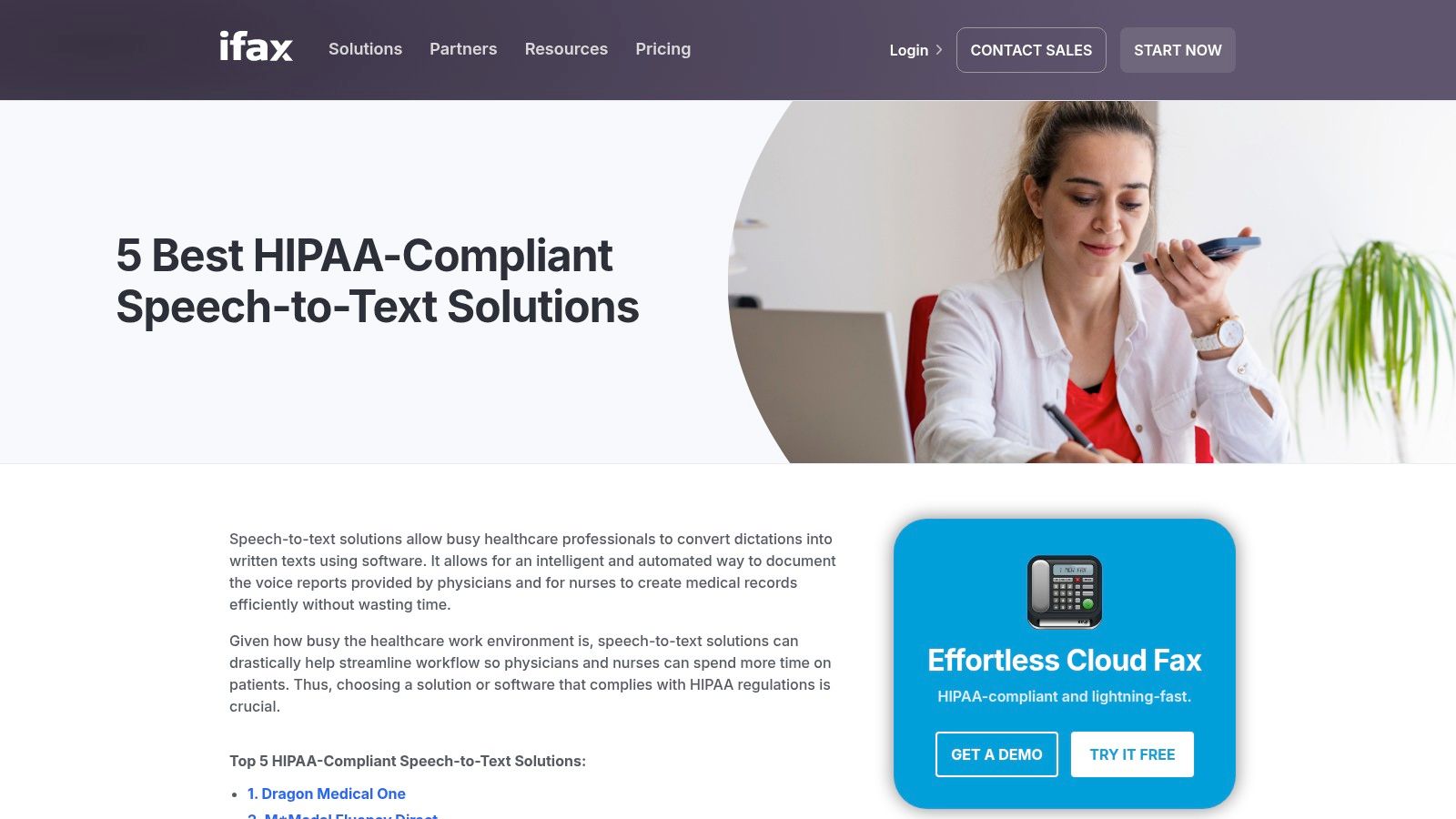
- Best For: Hospitals and clinics focused on improving Clinical Documentation Improvement (CDI) at the point of creation.
- Key Feature: Real-time, in-workflow Computer-Assisted Physician Documentation (CAPD) to provide instant clinical insights.
- Pricing: Subscription-based. Pricing is customized for enterprise deployments and requires contacting 3M or a certified reseller.
- Limitation: The advanced CAPD features can require initial user training to maximize their benefit, and like all cloud solutions, it depends on a stable internet connection for performance.
Learn more about M*Modal Fluency Direct
11. Braina Pro
Braina Pro positions itself as a versatile AI-powered virtual assistant with strong speech recognition capabilities, rather than a dedicated medical tool. It excels in supporting over 100 languages, allowing it to serve a diverse user base that may not be covered by more specialized software. While it lacks a built-in medical-specific vocabulary, its ability to learn custom terms and create voice commands for automating repetitive tasks offers a unique advantage for tech-savvy clinicians in smaller practices. This makes it a flexible, budget-friendly option for general dictation.
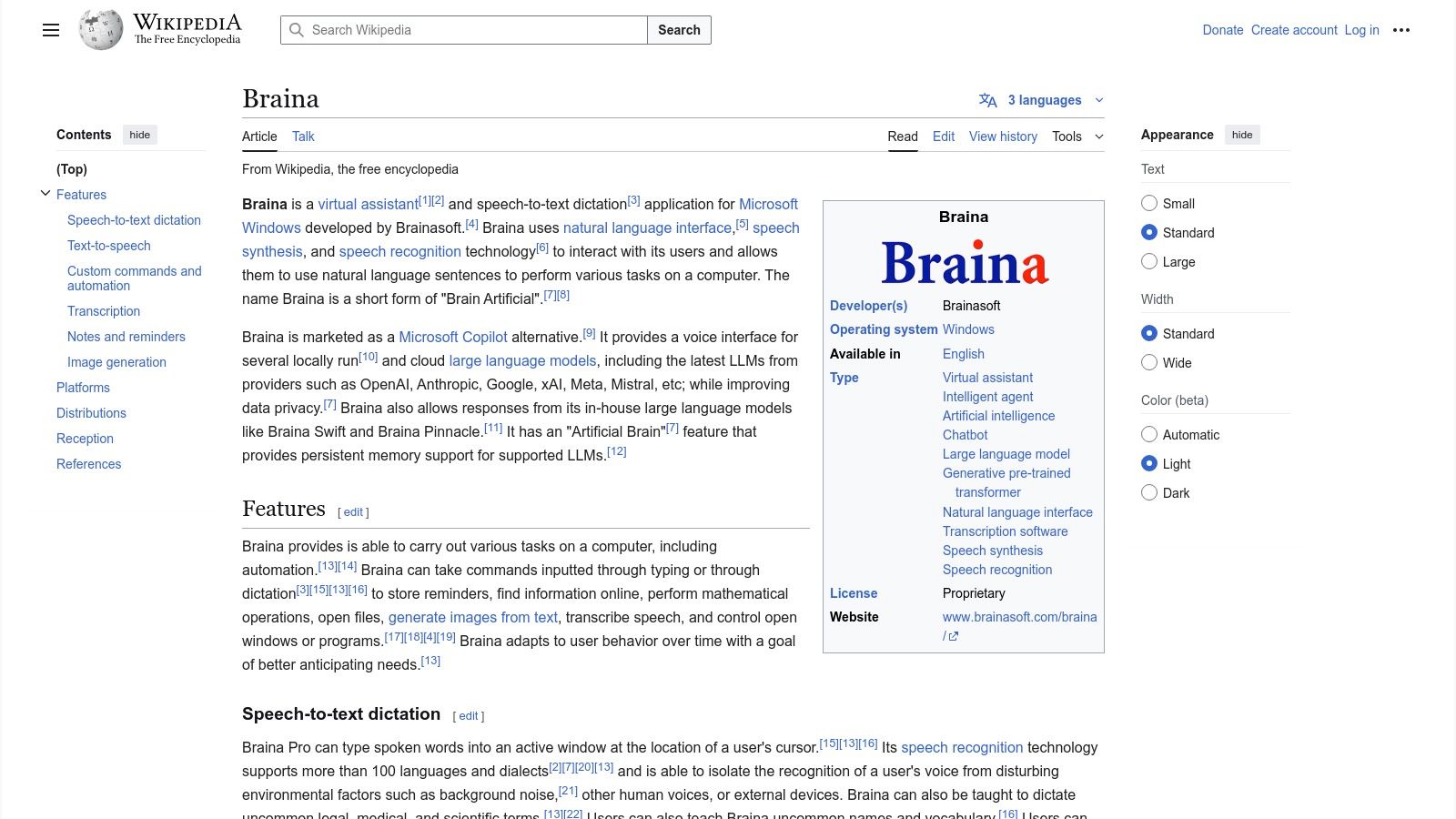
The platform functions more like a personal productivity tool that can be adapted for clinical notes, prescription writing, and controlling a PC via its mobile app. For professionals who require a multi-functional tool that goes beyond simple dictation, Braina Pro provides a compelling alternative. It is not designed for deep EHR integration, but its affordability and user-friendly interface make it a noteworthy piece of dictation software for medical professionals with lighter documentation needs or those in non-English speaking regions.
- Best For: Multilingual medical professionals or small practices seeking an affordable, multi-purpose dictation and productivity tool.
- Key Feature: Supports over 100 languages for dictation and allows users to create custom voice commands to automate workflows.
- Pricing: One-time purchase for a lifetime license (Braina Pro). A free version with limited features is also available.
- Limitation: It lacks a comprehensive, built-in medical vocabulary, requiring users to manually train it for clinical terminology. It is also primarily a Windows application.
12. Speechnotes
Speechnotes offers a remarkably simple and accessible entry point into voice-to-text technology, functioning as a free, web-based tool powered by Google's speech recognition engine. Its standout feature is its sheer simplicity; there is no software to install or account to create. Users can open the website, click the microphone, and start dictating immediately. This makes it a practical option for quick, non-sensitive notes or for medical students and professionals looking to experiment with dictation without any financial commitment.
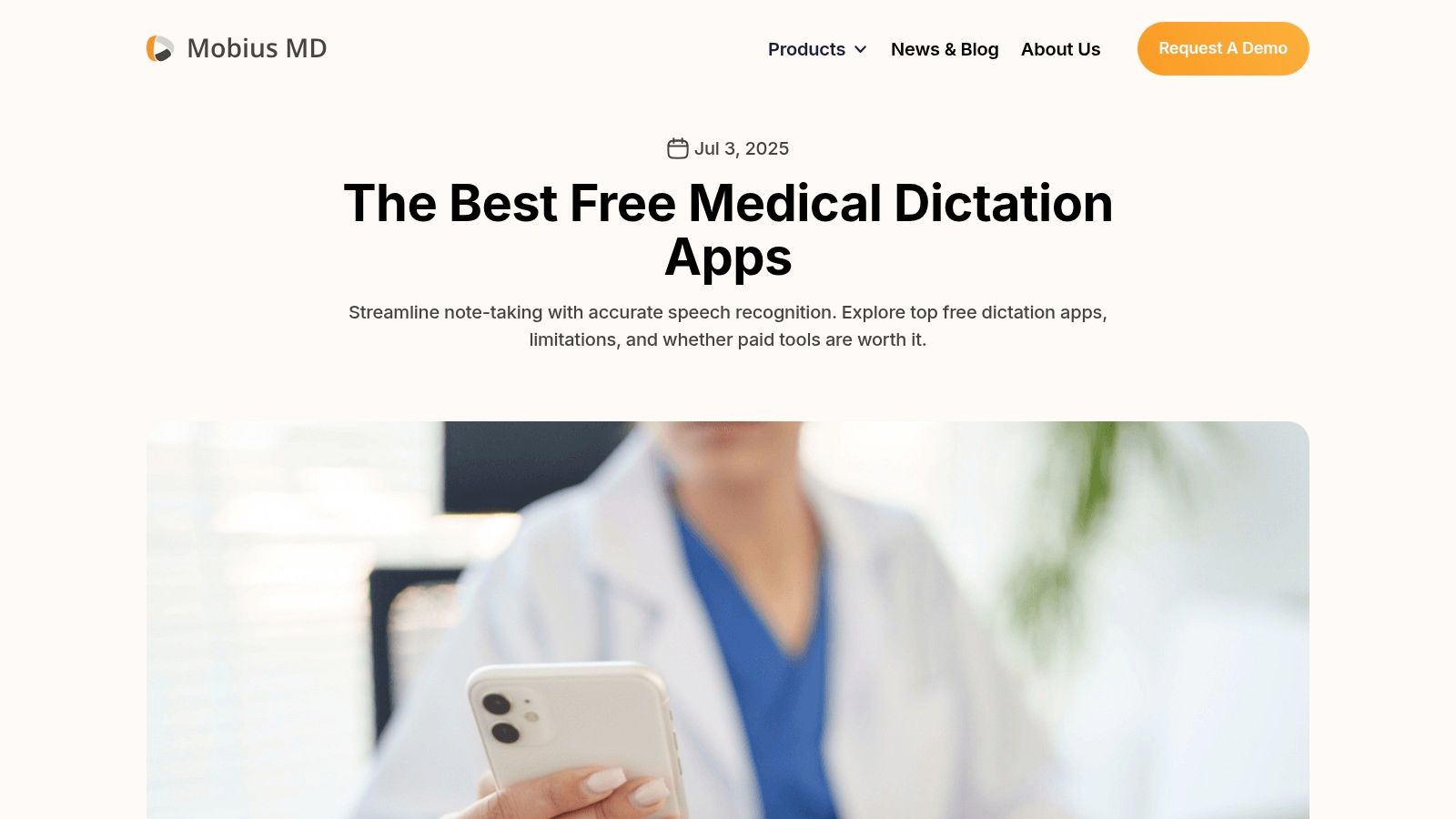
While it is not a dedicated medical tool and lacks specialized vocabularies and EHR integration, its convenience is undeniable for drafting emails, personal notes, or initial thoughts that can be copied elsewhere. Speechnotes is a solid, no-frills tool for general-purpose dictation, but it is not a HIPAA-compliant solution for handling patient health information. Its value lies in its cost-free accessibility, making it a useful, if limited, piece of dictation software for medical professionals with basic needs.
- Best For: Medical students, residents, or clinicians needing a quick, free tool for non-clinical or non-sensitive dictation tasks.
- Key Feature: Instant, browser-based access with no registration or software installation required for immediate use.
- Pricing: Free to use. Optional premium features are available through a subscription model.
- Limitation: It lacks a medical-specific vocabulary and is not HIPAA compliant, making it unsuitable for clinical documentation or handling patient data.
Key Features Comparison of 12 Medical Dictation Tools
| Product | Core Features / Capabilities | User Experience / Quality ★ | Value & Pricing 💰 | Target Audience 👥 | Unique Selling Points / Highlights ✨ |
|---|---|---|---|---|---|
| 🏆 Whisperit | AI dictation, transcription, case analysis, legal research | ★★★★★ Intuitive, real-time collaboration | Custom pricing, strong ROI potential | Legal, healthcare, compliance | Swiss privacy/encryption, 10× faster docs, templates |
| Nuance Communications – Dragon Medical One | Medical vocab, EHR integration, cloud-based, voice commands | ★★★★ High accuracy medical dictation | Higher cost, premium healthcare tool | Healthcare professionals | Real-time EHR dictation, medical specialty support |
| VoiceboxMD | Medical vocab, real-time transcription, EHR compatibility | ★★★★ User-friendly, regular updates | Not publicly listed | Healthcare providers | HIPAA compliant, multi-EHR support |
| Sonix | Multilingual, custom vocab, cloud-based | ★★★★ Fast, user-friendly interface | Flexible pricing | Global healthcare & transcription | 50+ languages, app integrations |
| Mobius MD – Mobius Conveyor | Cross-platform, secure memos, HIPAA compliant | ★★★★ Easy setup, intuitive UI | Flexible subscriptions | Medical professionals | Mac/Windows compatible, no special hardware needed |
| DeepScribe | AI listens in real-time, note generation, EHR templates | ★★★★ Enhances interaction, customizable | Custom pricing | Healthcare providers | AI-driven live notes, specialty templates |
| Philips SpeechLive | Multi-device input, hybrid transcription, workflow management | ★★★★ User-friendly, multi-language | Flexible plans | Medical & general dictation | Hybrid human/AI transcription, priority routing |
| Amazon Transcribe Medical | Specialized models, archive generation, speaker ID | ★★★★ Scalable, batch transcription | Pay-as-you-go | Developers & healthcare IT | HIPAA eligible, machine learning models |
| nVoq – SayIt | Custom templates, EHR integration, voice commands | ★★★★ Affordable, easy implementation | Affordable pricing | Healthcare specialties | Cloud-based, voice-activated commands |
| M*Modal Fluency Direct | Real-time speech-to-text, EHR integration, mobile app | ★★★★ Improves efficiency, voice commands | Custom/product licensing | Healthcare providers | Mobile app, NLP-enhanced recognition |
| Braina Pro | Multilingual, custom voice commands, task automation | ★★★ User-friendly, regular updates | Affordable pricing | General users, professionals | Virtual assistant, PC remote control |
| Speechnotes | Chrome extension, real-time transcription, offline mode | ★★★ Free & lightweight, fast | Freemium with premium options | Casual users, note takers | Simple interface, offline mode |
Making the Right Choice for Your Medical Practice
Navigating the landscape of dictation software for medical professionals can feel overwhelming, but making an informed choice is a critical step toward reclaiming valuable time and enhancing patient care. We've explored a wide array of tools, from comprehensive, cloud-based platforms like Dragon Medical One and M*Modal Fluency Direct to innovative, AI-powered solutions like DeepScribe and specialized mobile options like Mobius Conveyor. The central takeaway is clear: the "best" software is not a one-size-fits-all solution but the one that aligns precisely with your practice's unique workflow, budget, and technical requirements.
Your decision-making process should be guided by a clear understanding of your specific needs. A large hospital system will have different priorities, such as seamless EHR integration and robust administrative controls, compared to a small, independent clinic that might prioritize affordability and ease of setup. The right choice hinges on balancing advanced features with practical usability.
Key Considerations Before You Commit
Before finalizing your selection, revisit these critical factors. Consider them a final checklist to ensure the software you choose will be an asset, not a hindrance, to your daily operations.
- EHR Integration: Is seamless, out-of-the-box integration with your existing Electronic Health Record system a must-have? Tools like Dragon Medical One and nVoq’s SayIt often excel here, but always verify compatibility with your specific EHR vendor.
- Accuracy and Specialization: How well does the software understand your specific medical specialty's terminology? Look for solutions with extensive, customizable medical vocabularies. An AI that learns your speech patterns, like those in Braina Pro or DeepScribe, can be a significant long-term advantage.
- Workflow and Mobility: Do you need to dictate on the go, moving between exam rooms or even working from home? Mobile-first solutions like Mobius Conveyor or cloud-based platforms with strong mobile apps like Philips SpeechLive offer the flexibility modern practitioners demand.
- Security and Compliance: Non-negotiable for any medical tool, HIPAA compliance is the baseline. Dig deeper into the security protocols. Does the vendor offer a Business Associate Agreement (BAA)? How is data encrypted, both in transit and at rest? Platforms like Amazon Transcribe Medical are built with this security foundation in mind.
- Implementation and Support: What level of training and technical support will your team need? Consider the implementation process, the availability of customer support, and the overall user-friendliness of the interface. A powerful tool is useless if the learning curve is too steep for your staff.
Your Actionable Next Steps
Armed with this information, your path forward is clearer. Begin by shortlisting two or three top contenders from this list that appear to meet your primary criteria. The next crucial step is to engage directly with these options.
- Request a Live Demo: A pre-recorded video is not enough. Schedule a live demonstration tailored to your medical specialty and workflow.
- Initiate a Free Trial: The ultimate test is real-world application. Use a trial period to dictate actual (anonymized) patient notes and see how the software performs under pressure.
- Involve Your Team: Get feedback from everyone who will use the software, from physicians to medical assistants. User adoption is key to realizing a return on your investment.
Investing in the right dictation software is an investment in efficiency, accuracy, and, most importantly, your own well-being. By automating the burdensome task of clinical documentation, you unlock more time to focus on what truly matters: your patients.
Ready to experience the next generation of AI-powered medical dictation? Whisperit leverages cutting-edge technology to deliver unparalleled accuracy and a streamlined user experience, designed specifically for the demands of modern healthcare. See how our secure, intuitive platform can transform your documentation workflow by visiting Whisperit to learn more and start your trial.